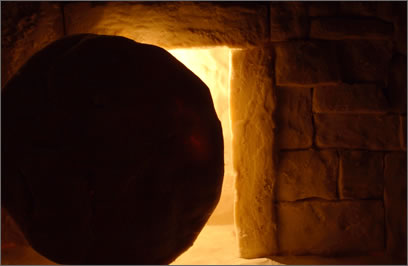Normally, I do not write about topics that are covered in previous messages. However, today I must make an exception. This past Easter I delivered a message by the same title of this article. The message centered around the future implications that come from Christ having been risen from the dead. It seems to me that many do not contemplate the great impact that Christ’s resurrection has made. Many try to imagine what it must have been like to have been at the tomb on the first Easter morning. What would it have been like to have watched the motionless body of Christ animate with life anew? Would there have been a spectacular light shining about his body or would it have just involved Christ getting up as if He had been slumbering? Such questions are important, however one often forgets what such an occurrence means for the future. Paul and John provide answers in 1 Corinthians 15 and Revelation 20-22.
1. The Resurrection of Christ Indicates the Future Resurrection of Humanity.
Some think that only believers will take part in the future resurrection. However, the New Testament makes it clear that everyone will take part in some form of a resurrection at the end of time. Paul writes “For as in Adam all die, so in Christ all will be made alive” (1 Corinthians 15:22).[1] In the book of Revelation, John notes that two resurrections exist. The first resurrection consists of those who are in Christ. John writes that “Blessed and holy are those who share in the first resurrection” (Revelation 20:6). The second resurrection consists of individuals who are not in Christ. Nevertheless, all individuals will have a similar resurrection experience as Christ had. Some, however, will experience a resurrection unto life eternal, whereas others will experience a resurrection unto a tormented eternity. As Paul denotes, “The last enemy to be destroyed is death” (1 Corinthians 15:26). If Christ has risen, then death is already defeated.
2. The Resurrection of Christ Indicates the Future Defeat of Evil.
This point I have taken straight from my message. Easter promises the future defeat of evil. In fact, evil has already been defeated. How so? Isn’t there still evil in the world? Yes, however it is only momentary. For the resurrection of Christ ensures us that eventually “the end will come, when he hands over the kingdom to God the Father after he has destroyed all dominion, authority and power” (1 Corinthians 15:24). In Revelation, John notes that “the devil, who deceived them, was thrown into the lake of burning sulfur, where the beast and the false prophet had been thrown. They will be tormented day and night for ever and ever” (Revelation 20:10). How do you defeat evil? You must destroy the root cause of evil. Case in point, have you ever had a boil? Boils are painful sores that are caused by an inflammation of a hair follicle. Anyone who has ever had a boil knows that they are pesky and sometimes painful. The boil may burst and one may think that they have cured the problem. However, if the seed of the boil is not removed, the boil will return. Similarly, if the symptoms of a disease are treated and the disease itself is not cured, no true healing can ever transpire. The root cause of evil in the world is Satan, the adversary of God and the faithful. The only way to permanently rid society of evil is to eliminate the presence of the evil one. Easter promises that good will eventually win and evil will be defeated.
3. The Resurrection of Christ Indicates the Rewards of Heaven.
Paul writes that “no eye has seen, what no ear has heard, and what no human mind has conceived–the things that God has prepared for those who love him” (1 Corinthians 2:9; see also Isaiah 64:4). Due to the eternal life promised through Christ’s resurrection and the future defeat of evil, one can conclude, as does the New Testament, that Easter ensures the future established reward of the faithful. In Revelation 21, John writes that God will “wipe every tear from their eyes. There will be no more death or mourning or crying or pain, for the old order of things has passed away” (Revelation 21:4). The One sitting on the throne even states “I am making everything new” (Revelation 21:5)! Easter provides the great hope that a better life awaits the faithful of God.
Conclusion:
Many have often said, “You Christians focus on the afterlife and do not live in the present.” That is not necessarily the case. For the Christian knows that he or she has a purpose here on the earth. They are called to do a particular task. Yet, because of the resurrection of Christ, the Christian has the hope in knowing that this life is not all that there is. There is a better day coming. As Bob Dill wisely said in Bible study, “The Bible tells us things are going to get bad, then get worse, but things will eventually get better.” That is so true. Easter provides us with the hope that we do not have all of our eggs in one basket (pun intended) in that this life is all there is. Rather, we have the hope in knowing that the things done on this earth really matter and hold an eternal significance. Life is tough. But heaven awaits! As a t-shirt I once saw noted, “Keep working for the Lord, the pay isn’t much, but the retirement plan is OUT OF THIS WORLD!!!”
Happy Easter!!!
Pastor Brian
Copyright April 2015. Brian Chilton.
[1] Unless otherwise noted, all Scripture comes from the New International Version (Grand Rapids: Biblica, 2011).





